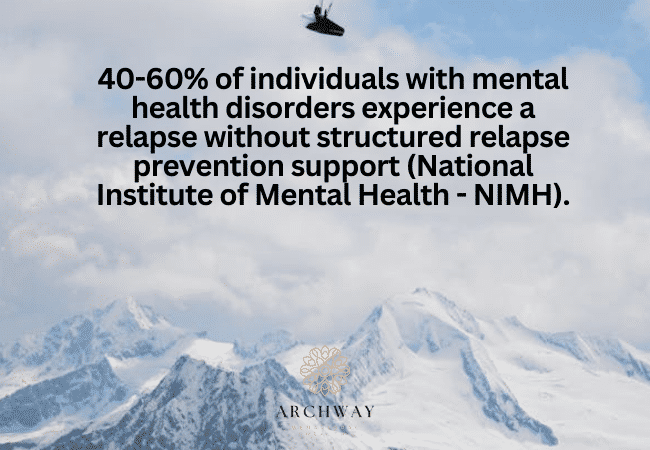Mental health recovery is not a linear process—it involves ongoing commitment, self-awareness, and the right support systems. Whether an individual is recovering from anxiety, depression, bipolar disorder, or trauma-related conditions, the risk of relapse is a common concern. Studies show that 40-60% of individuals with mental health disorders experience a relapse if they do not have a structured relapse prevention plan (National Institute of Mental Health – NIMH).
At Archway Behavioral Health, we recognize that mental health recovery extends beyond initial treatment. Our Relapse Prevention Programs are designed to equip individuals with the skills, strategies, and support systems needed to sustain their progress and maintain long-term emotional stability.
This guide explores:
- What relapse prevention is and why it’s essential
- Common relapse triggers and how to manage them
- The role of evidence-based therapy in relapse prevention
- How structured mental health treatment services help maintain recovery
What Is Relapse Prevention?
Relapse prevention is a structured approach that helps individuals:
- Recognize early warning signs of a relapse.
- Develop healthy coping strategies to manage stress and emotional triggers.
- Strengthen self-awareness and emotional regulation.
- Build support systems to maintain long-term stability.
A relapse doesn’t mean failure—it simply means adjustments are needed to reinforce mental well-being. Having a personalized relapse prevention plan in place significantly increases the chances of sustaining long-term recovery.
Understanding Mental Health Relapse: Causes and Warning Signs
Mental health relapse happens when symptoms of anxiety, depression, trauma, or bipolar disorder re-emerge, making it difficult to function in daily life.
Common Triggers of Relapse
- High levels of stress from work, relationships, or personal challenges.
- Social isolation and lack of support networks.
- Skipping therapy sessions or stopping medication without medical guidance.
- Negative thought patterns that lead to self-doubt and emotional distress.
- Poor sleep, nutrition, or lack of exercise, which affect mental health.
- Exposure to traumatic events or unresolved emotional wounds.
Early Warning Signs of a Mental Health Relapse
- Feeling overwhelmed or unable to cope with daily stressors.
- Increased irritability, mood swings, or emotional instability.
- Loss of interest in activities previously enjoyed.
- Changes in sleep patterns or appetite.
- Social withdrawal and isolation.
- Difficulty concentrating or making decisions.
Recognizing these warning signs early allows individuals to take proactive steps to prevent a full relapse.
How Evidence-Based Therapies Support Relapse Prevention
At Archway Behavioral Health, we integrate scientifically validated therapies into our Relapse Prevention Programs to provide long-term support.
Cognitive Behavioral Therapy (CBT): Managing Thought Patterns
CBT is highly effective for identifying and changing negative thought patterns that can lead to relapse.
CBT Helps Individuals:
- Recognize harmful thinking patterns that trigger symptoms.
- Develop healthy coping mechanisms for stress and emotional regulation.
- Strengthen problem-solving skills to prevent crisis situations.
Studies show that CBT reduces relapse rates by 50% for individuals with depression and anxiety disorders (Journal of Clinical Psychology).
Dialectical Behavioral Therapy (DBT): Emotional Regulation and Distress Tolerance
DBT is particularly effective for individuals struggling with bipolar disorder, trauma, and emotional dysregulation.
DBT Provides:
- Mindfulness techniques to stay present and manage distress.
- Emotional regulation strategies to reduce impulsivity and mood swings.
- Relationship-building skills to improve interpersonal connections.
DBT is widely used in Trauma Treatment Programs and Bipolar Treatment Programs to prevent relapse caused by emotional instability.
Individual Therapy: Ongoing One-on-One Support
Individual Therapy plays a crucial role in relapse prevention by:
- Helping individuals process personal challenges and emotions.
- Providing personalized strategies to maintain mental health stability.
- Offering regular check-ins to track progress and adjust coping techniques.
Through ongoing therapy, individuals receive continuous support as they navigate life’s challenges.
Group Therapy Programs: The Power of Peer Support
Group Therapy Programs help individuals build a strong support network with others who understand their struggles.
Benefits of Group Therapy in Relapse Prevention:
- Provides a sense of community and belonging.
- Encourages accountability and motivation.
- Helps individuals learn from others’ experiences and coping strategies.
Studies show that people who engage in group therapy have a 30-50% lower chance of relapse compared to those who rely solely on individual therapy (American Group Psychotherapy Association – AGPA).
The Role of Structured Mental Health Treatment in Relapse Prevention
For individuals who need ongoing professional support, structured mental health programs provide comprehensive relapse prevention strategies.
Partial Hospitalization Program (PHP): Intensive Day Treatment
- Offers structured therapy sessions five days a week.
- Includes CBT, DBT, and holistic therapies.
- Provides psychiatric support and medication management.
- Helps individuals transition from inpatient care to outpatient stability.
Intensive Outpatient Program (IOP): Flexible Support for Long-Term Recovery
- Allows individuals to continue therapy while managing work and personal life.
- Focuses on relapse prevention, stress management, and emotional resilience.
- Helps individuals maintain independence while receiving structured care.
PHP and IOP programs are ideal for individuals who need more support than traditional outpatient therapy but do not require full-time inpatient care.

Holistic Approaches to Relapse Prevention
In addition to evidence-based therapies, holistic approaches enhance overall mental health and reduce the likelihood of relapse.
- Mindfulness and Meditation: Teaches individuals to stay grounded and manage stress.
- Exercise and Nutrition: Improves mood and cognitive function.
- Creative Therapies (Art, Music, Writing): Helps individuals process emotions in a healthy way.
- Sleep Hygiene Strategies: Enhances emotional stability and reduces relapse risks.
Why Choose Archway Behavioral Health for Relapse Prevention?
At Archway Behavioral Health, we provide a comprehensive, individualized approach to relapse prevention by:
- Offering evidence-based therapy programs tailored to each individual’s needs.
- Providing multiple levels of care, including PHP, IOP, and Outpatient Therapy.
- Integrating holistic wellness strategies to enhance overall mental health.
- Ensuring long-term support through ongoing therapy and peer networks.
Your mental health matters. Your progress matters. And most importantly, your future is worth investing in. Let Archway Behavioral Health help you build a foundation for lifelong wellness.
Conclusion
Mental health recovery is a lifelong journey, not a one-time event. Preventing relapse requires ongoing support, self-awareness, and the right coping strategies. Whether you are managing anxiety, depression, trauma, or bipolar disorder, having a structured plan in place can help you maintain emotional stability, avoid setbacks, and continue progressing toward a healthier life.
At Archway Behavioral Health, we believe that true recovery is about more than just symptom management—it’s about building resilience, fostering self-growth, and developing the tools to navigate life’s challenges with confidence. Call Archway Behavioral Health at 888.488.4103 to speak with a mental health specialist. Our Relapse Prevention Programs integrate evidence-based therapies, structured mental health treatment services, and holistic wellness approaches to ensure that every individual has the support they need for lasting success.
Frequently Asked Questions (FAQ)
What is a Relapse Prevention Program for mental health?
A Relapse Prevention Program is a structured plan that helps individuals recognize triggers, develop coping skills, and maintain emotional stability to prevent setbacks in their mental health recovery. Programs include therapy, support groups, and holistic wellness strategies.
Who can benefit from a Relapse Prevention Program?
Anyone recovering from anxiety, depression, trauma, bipolar disorder, or other mental health conditions can benefit. It is especially helpful for those transitioning from intensive care, such as PHP or IOP, to outpatient support.
What are common triggers for mental health relapse?
Mental health relapse can be triggered by:
- High levels of stress or emotional distress.
- Skipping therapy sessions or discontinuing medication without medical supervision.
- Social isolation or lack of a support network.
- Exposure to past trauma or unresolved emotional wounds.
- Unhealthy coping mechanisms, such as substance use or avoidance behaviors.
How does Cognitive Behavioral Therapy (CBT) help with relapse prevention?
CBT teaches individuals how to:
- Identify negative thought patterns that contribute to relapse.
- Develop problem-solving skills for handling stress.
- Build healthy coping mechanisms to maintain emotional stability.
Studies show that CBT reduces relapse rates by up to 50% for individuals with anxiety and depression (Journal of Clinical Psychology).
What role does Dialectical Behavioral Therapy (DBT) play in preventing relapse?
DBT is particularly effective for individuals struggling with bipolar disorder, trauma, or emotional dysregulation. It helps by:
- Teaching mindfulness techniques to manage distress.
- Improving emotional regulation and impulse control.
- Enhancing relationship and communication skills to prevent conflict-related setbacks.
Can holistic wellness strategies reduce the risk of mental health relapse?
Yes! Holistic approaches such as meditation, exercise, proper nutrition, and creative therapies (art/music therapy) help regulate mood, manage stress, and support emotional balance—reducing the likelihood of relapse.


